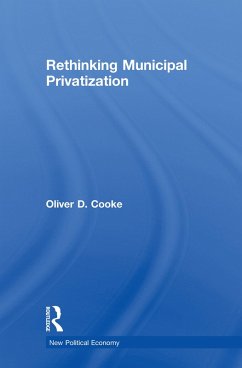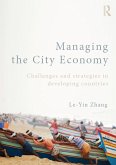Oliver D. Cooke
Rethinking Municipal Privatization (eBook, PDF)
31,95 €
31,95 €
inkl. MwSt.
Sofort per Download lieferbar

16 °P sammeln
31,95 €
Als Download kaufen

31,95 €
inkl. MwSt.
Sofort per Download lieferbar

16 °P sammeln
Jetzt verschenken
Alle Infos zum eBook verschenken
31,95 €
inkl. MwSt.
Sofort per Download lieferbar
Alle Infos zum eBook verschenken

16 °P sammeln
Oliver D. Cooke
Rethinking Municipal Privatization (eBook, PDF)
- Format: PDF
- Merkliste
- Auf die Merkliste
- Bewerten Bewerten
- Teilen
- Produkt teilen
- Produkterinnerung
- Produkterinnerung

Bitte loggen Sie sich zunächst in Ihr Kundenkonto ein oder registrieren Sie sich bei
bücher.de, um das eBook-Abo tolino select nutzen zu können.
Hier können Sie sich einloggen
Hier können Sie sich einloggen
Sie sind bereits eingeloggt. Klicken Sie auf 2. tolino select Abo, um fortzufahren.

Bitte loggen Sie sich zunächst in Ihr Kundenkonto ein oder registrieren Sie sich bei bücher.de, um das eBook-Abo tolino select nutzen zu können.
This book examines one of the most high-profile municipal privatizations the privatization of New York City's Central Park. This fascinating account highlights the immense theoretical and political issues involved in radically rethinking privatization in both the municipal and global contexts.
- Geräte: PC
- mit Kopierschutz
- eBook Hilfe
- Größe: 1MB
Andere Kunden interessierten sich auch für
![Rethinking Municipal Privatization (eBook, ePUB) Rethinking Municipal Privatization (eBook, ePUB)]() Oliver D. CookeRethinking Municipal Privatization (eBook, ePUB)31,95 €
Oliver D. CookeRethinking Municipal Privatization (eBook, ePUB)31,95 €![Data-Driven Smart Community Design (eBook, PDF) Data-Driven Smart Community Design (eBook, PDF)]() Data-Driven Smart Community Design (eBook, PDF)46,95 €
Data-Driven Smart Community Design (eBook, PDF)46,95 €![Managing the City Economy (eBook, PDF) Managing the City Economy (eBook, PDF)]() Le-Yin ZhangManaging the City Economy (eBook, PDF)66,95 €
Le-Yin ZhangManaging the City Economy (eBook, PDF)66,95 €![The Political Economy of the European Social Model (eBook, PDF) The Political Economy of the European Social Model (eBook, PDF)]() Philip WhymanThe Political Economy of the European Social Model (eBook, PDF)55,95 €
Philip WhymanThe Political Economy of the European Social Model (eBook, PDF)55,95 €![Everyday Economic Practices (eBook, PDF) Everyday Economic Practices (eBook, PDF)]() Savinna ChowdhuryEveryday Economic Practices (eBook, PDF)47,95 €
Savinna ChowdhuryEveryday Economic Practices (eBook, PDF)47,95 €![Neoliberalism and Urban Development in Latin America (eBook, PDF) Neoliberalism and Urban Development in Latin America (eBook, PDF)]() Neoliberalism and Urban Development in Latin America (eBook, PDF)41,95 €
Neoliberalism and Urban Development in Latin America (eBook, PDF)41,95 €![The Piratization of Russia (eBook, PDF) The Piratization of Russia (eBook, PDF)]() Marshall I. GoldmanThe Piratization of Russia (eBook, PDF)23,95 €
Marshall I. GoldmanThe Piratization of Russia (eBook, PDF)23,95 €-
-
-
This book examines one of the most high-profile municipal privatizations the privatization of New York City's Central Park. This fascinating account highlights the immense theoretical and political issues involved in radically rethinking privatization in both the municipal and global contexts.
Dieser Download kann aus rechtlichen Gründen nur mit Rechnungsadresse in A, B, BG, CY, CZ, D, DK, EW, E, FIN, F, GR, HR, H, IRL, I, LT, L, LR, M, NL, PL, P, R, S, SLO, SK ausgeliefert werden.
Produktdetails
- Produktdetails
- Verlag: Taylor & Francis
- Seitenzahl: 210
- Erscheinungstermin: 26. Dezember 2007
- Englisch
- ISBN-13: 9781135897918
- Artikelnr.: 42983834
- Verlag: Taylor & Francis
- Seitenzahl: 210
- Erscheinungstermin: 26. Dezember 2007
- Englisch
- ISBN-13: 9781135897918
- Artikelnr.: 42983834
- Herstellerkennzeichnung Die Herstellerinformationen sind derzeit nicht verfügbar.
Oliver D. Cooke
1. Municipal Privatization: An Introduction1.1 Institutional Forms and
Conceptions of Privatization1.2 New York City's Privatization Experience
During the 1990s2. The Evolution of the Municipal Privatization
Discourse2.1 The Development of a Theory of Privatization2.2 A Theory Comes
of Age: The 1970s Watershed and Urban Fiscal Crisis2.3 The Reagan Years2.4
The 1990s: Reinventing Government2.5 The Heterodox Terrain of the
Privatization Discourse: the 1970s and Early 1980s2.6 Retrenchment and the
Heterodox Discourse of the 1980s2.7 The Mid- to Late 1980s: Entrepreneurial
Government2.8 The 1990s: Neoliberalism and Globalization2.9 Critiquing the
Discourse: Assessing Methodology and Content3. A Class Approach to
Municipal Privatization3.1 The Class Process, Classes, and the Subsumed
Class Process3.2 Overdetermination3.3 The Implications of a Class Approach
to Municipal Privatization.Appendix: Post-Privatization Wage Outcomes4. A
Class Analysis of Central Park's Privatization4.1 The Historical Backdrop
to Central Park's Privatization4.2 A Class Analytic Interpretation of
Central Park's Privatization4.3 Conceptualizing the Central Park
Commodity4.4 The Central Park Commodity's Production4.5 A Class Analytic
Model of the Central Park Conservancy.Appendix: Estimating the Central Park
Commodity's Cost Price5. The Class Analytic Implications of Central Park's
Privatization5.1 Beyond Efficiency and Cost5.2 The Central Park
Conservancy's Fundraising and the Capitalist Sector5.3 The Central Park
Conservancy's Fundraising and the Non-profit Sector5.4 Central Park's
Privatization and Independent and Communist Producers5.5 Municipal
Privatizations as Ensembles6. Rethinking Municipal Privatization6.1
Non-Progressive Municipal Privatizations6.2 Non-Capitalist Enterprises and
their Viability in the Context of Municipal Privatization6.3 Progressive
Municipal Privatizations: Democratic Enterprise Formation6.4 The Policy
Merits of Progressive Municipal Privatizations6.5 Rethinking Municipal
Privatization on the Left7. Rethinking the Privatization of State-Owned
Enterprises7.1 The Global Privatization Movement7.2 The Motives for
Privatizations7.3 Methods of Divestiture7.4 What Privatizations of
State-Owned Enterprises have done and not done: a Class Analytic
Interpretation7.5 Theorizing Progressive Privatizations Involving
State-Owned Enterprises7.6 The Policy Implications of Progressive
Privatizations
Conceptions of Privatization1.2 New York City's Privatization Experience
During the 1990s2. The Evolution of the Municipal Privatization
Discourse2.1 The Development of a Theory of Privatization2.2 A Theory Comes
of Age: The 1970s Watershed and Urban Fiscal Crisis2.3 The Reagan Years2.4
The 1990s: Reinventing Government2.5 The Heterodox Terrain of the
Privatization Discourse: the 1970s and Early 1980s2.6 Retrenchment and the
Heterodox Discourse of the 1980s2.7 The Mid- to Late 1980s: Entrepreneurial
Government2.8 The 1990s: Neoliberalism and Globalization2.9 Critiquing the
Discourse: Assessing Methodology and Content3. A Class Approach to
Municipal Privatization3.1 The Class Process, Classes, and the Subsumed
Class Process3.2 Overdetermination3.3 The Implications of a Class Approach
to Municipal Privatization.Appendix: Post-Privatization Wage Outcomes4. A
Class Analysis of Central Park's Privatization4.1 The Historical Backdrop
to Central Park's Privatization4.2 A Class Analytic Interpretation of
Central Park's Privatization4.3 Conceptualizing the Central Park
Commodity4.4 The Central Park Commodity's Production4.5 A Class Analytic
Model of the Central Park Conservancy.Appendix: Estimating the Central Park
Commodity's Cost Price5. The Class Analytic Implications of Central Park's
Privatization5.1 Beyond Efficiency and Cost5.2 The Central Park
Conservancy's Fundraising and the Capitalist Sector5.3 The Central Park
Conservancy's Fundraising and the Non-profit Sector5.4 Central Park's
Privatization and Independent and Communist Producers5.5 Municipal
Privatizations as Ensembles6. Rethinking Municipal Privatization6.1
Non-Progressive Municipal Privatizations6.2 Non-Capitalist Enterprises and
their Viability in the Context of Municipal Privatization6.3 Progressive
Municipal Privatizations: Democratic Enterprise Formation6.4 The Policy
Merits of Progressive Municipal Privatizations6.5 Rethinking Municipal
Privatization on the Left7. Rethinking the Privatization of State-Owned
Enterprises7.1 The Global Privatization Movement7.2 The Motives for
Privatizations7.3 Methods of Divestiture7.4 What Privatizations of
State-Owned Enterprises have done and not done: a Class Analytic
Interpretation7.5 Theorizing Progressive Privatizations Involving
State-Owned Enterprises7.6 The Policy Implications of Progressive
Privatizations
1. Municipal Privatization: An Introduction1.1 Institutional Forms and
Conceptions of Privatization1.2 New York City's Privatization Experience
During the 1990s2. The Evolution of the Municipal Privatization
Discourse2.1 The Development of a Theory of Privatization2.2 A Theory Comes
of Age: The 1970s Watershed and Urban Fiscal Crisis2.3 The Reagan Years2.4
The 1990s: Reinventing Government2.5 The Heterodox Terrain of the
Privatization Discourse: the 1970s and Early 1980s2.6 Retrenchment and the
Heterodox Discourse of the 1980s2.7 The Mid- to Late 1980s: Entrepreneurial
Government2.8 The 1990s: Neoliberalism and Globalization2.9 Critiquing the
Discourse: Assessing Methodology and Content3. A Class Approach to
Municipal Privatization3.1 The Class Process, Classes, and the Subsumed
Class Process3.2 Overdetermination3.3 The Implications of a Class Approach
to Municipal Privatization.Appendix: Post-Privatization Wage Outcomes4. A
Class Analysis of Central Park's Privatization4.1 The Historical Backdrop
to Central Park's Privatization4.2 A Class Analytic Interpretation of
Central Park's Privatization4.3 Conceptualizing the Central Park
Commodity4.4 The Central Park Commodity's Production4.5 A Class Analytic
Model of the Central Park Conservancy.Appendix: Estimating the Central Park
Commodity's Cost Price5. The Class Analytic Implications of Central Park's
Privatization5.1 Beyond Efficiency and Cost5.2 The Central Park
Conservancy's Fundraising and the Capitalist Sector5.3 The Central Park
Conservancy's Fundraising and the Non-profit Sector5.4 Central Park's
Privatization and Independent and Communist Producers5.5 Municipal
Privatizations as Ensembles6. Rethinking Municipal Privatization6.1
Non-Progressive Municipal Privatizations6.2 Non-Capitalist Enterprises and
their Viability in the Context of Municipal Privatization6.3 Progressive
Municipal Privatizations: Democratic Enterprise Formation6.4 The Policy
Merits of Progressive Municipal Privatizations6.5 Rethinking Municipal
Privatization on the Left7. Rethinking the Privatization of State-Owned
Enterprises7.1 The Global Privatization Movement7.2 The Motives for
Privatizations7.3 Methods of Divestiture7.4 What Privatizations of
State-Owned Enterprises have done and not done: a Class Analytic
Interpretation7.5 Theorizing Progressive Privatizations Involving
State-Owned Enterprises7.6 The Policy Implications of Progressive
Privatizations
Conceptions of Privatization1.2 New York City's Privatization Experience
During the 1990s2. The Evolution of the Municipal Privatization
Discourse2.1 The Development of a Theory of Privatization2.2 A Theory Comes
of Age: The 1970s Watershed and Urban Fiscal Crisis2.3 The Reagan Years2.4
The 1990s: Reinventing Government2.5 The Heterodox Terrain of the
Privatization Discourse: the 1970s and Early 1980s2.6 Retrenchment and the
Heterodox Discourse of the 1980s2.7 The Mid- to Late 1980s: Entrepreneurial
Government2.8 The 1990s: Neoliberalism and Globalization2.9 Critiquing the
Discourse: Assessing Methodology and Content3. A Class Approach to
Municipal Privatization3.1 The Class Process, Classes, and the Subsumed
Class Process3.2 Overdetermination3.3 The Implications of a Class Approach
to Municipal Privatization.Appendix: Post-Privatization Wage Outcomes4. A
Class Analysis of Central Park's Privatization4.1 The Historical Backdrop
to Central Park's Privatization4.2 A Class Analytic Interpretation of
Central Park's Privatization4.3 Conceptualizing the Central Park
Commodity4.4 The Central Park Commodity's Production4.5 A Class Analytic
Model of the Central Park Conservancy.Appendix: Estimating the Central Park
Commodity's Cost Price5. The Class Analytic Implications of Central Park's
Privatization5.1 Beyond Efficiency and Cost5.2 The Central Park
Conservancy's Fundraising and the Capitalist Sector5.3 The Central Park
Conservancy's Fundraising and the Non-profit Sector5.4 Central Park's
Privatization and Independent and Communist Producers5.5 Municipal
Privatizations as Ensembles6. Rethinking Municipal Privatization6.1
Non-Progressive Municipal Privatizations6.2 Non-Capitalist Enterprises and
their Viability in the Context of Municipal Privatization6.3 Progressive
Municipal Privatizations: Democratic Enterprise Formation6.4 The Policy
Merits of Progressive Municipal Privatizations6.5 Rethinking Municipal
Privatization on the Left7. Rethinking the Privatization of State-Owned
Enterprises7.1 The Global Privatization Movement7.2 The Motives for
Privatizations7.3 Methods of Divestiture7.4 What Privatizations of
State-Owned Enterprises have done and not done: a Class Analytic
Interpretation7.5 Theorizing Progressive Privatizations Involving
State-Owned Enterprises7.6 The Policy Implications of Progressive
Privatizations







